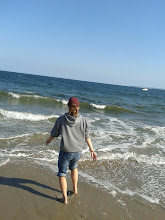So what is life really like here? Life as a Peace Corps volunteer here is significantly different than that of a Mauritanian, but there are still some similarities.
Peace Corps Volunteer – My experience:
It’s important to note that not everyone has the same experience or work schedules, so that will cause some variation. The technical “work-week” is Sunday-Thursday as the Holy Day here is Friday. Outside of banks, post-offices, government agencies, and major companies in Nouakchott, there is not much change from a weekday to a weekend. This means that many times volunteers will be doing work on a “weekend” and sometimes not during the “workweek”. I have been affectated to a government run micro finance institution, and so I have a more concrete work-week schedule.
Most days I like to get up early in the morning to get in some exercise before the sun gets the temperatures too high – this means I usually leave right before dawn. After my exercise I have to clean up the house and get it ready for the day. So, many times that involves sweeping out the sand that has migrated into my rooms, putting the mattresses inside (because I sleep outside), and making sure I have enough water for the day. Most people here have what is called a robinet (faucet or spicket) in their compounds, however, I do not. For those with a robinet it may take between 30min to an hour or more to fill up all their buckets, badones, and/or barrels with water for the day. My water comes from my landlord’s robinet, and so I have a 200 liter barrel in my compound that I fill every few days. I have a small hole in my wall so that the landlord can pass the hose though to me. After the house is picked up I can go to work, get food for the day, and/or visit with neighbors. Currently I am going to CAPEC (the micro finance institution) from about 9-12 each day (time is extremely flexible here). Around noon is when things start to die down for the afternoon heat and lunch hour. I generally go to my house to cook, eat, shower (again – you shower multiple times a day to help keep cool in the hot season), and sleep. Here lunch break is usually 3-4 hours because it is the main meal of the day and pretty much everyone will take a long nap (about an hour or more). After lunch break the market opens up again for a few hours, and I’ll do some more work, go to the market for dinner food, and/or visit. I will have a few pending evening projects with two English classes and a Math Club at a local primary school (each one day a week). After that, I’ll make dinner, relax, read, or visit people to close out the day.
Adults
Here in Akjoujt we have a Mining Society (Mauritanian Mining Company) that is open 24/7. It is actually mostly owned I believe by a Canadian Company, so the schedule is not very reflective of a traditional Mauritanian day. The vast majority of the workers are on a shift schedule that rotates every so often. So they will work either 7am-3pm, 3pm-11pm, or 11pm to 7am. Other mining workers will work your traditional 9-5 workday. These mine workers will take what meals they can with their families. Lunch is usually around 1pm-3pm, and dinner is often late: between 9 and 10pm.
For those adults who do not work at the mines, there are a variety of other options (the job market will be discussed in greater detail in another post). There is a Post office, bank and CAPEC which will all operate on a Sunday-Thursday schedule with at least 6 hours of business a day. Usually this is 8-12 and 4-6, but with the post office and CAPEC here the hours are just 8am-2pm, rather than re-opening after lunch. Other options include owning a boutique, carpentering, metal work, and electricians (all in the market place). Each of these tend to run around 9-12 and 4-6 each day in the market. As far as boutiques are concerned, many times these are run out of the home and will be “open” from 8am to midnight. The owners sit in the boutique and usually take their meals and tea there all day long.
Children:
Right now we are into the school year with compulsory education for all children after the age of 7 (technically – although it is not strictly enforced always). The traditional school schedule is from 8-12 and 3-5. Some private schools will take all 6 hours at once and end at 2pm before the children go home for the afternoon meal. I’ll discuss the subjects and schedules in more detail in an education post. When they are not in school kids will play outside for pretty much the entire day only breaking for the afternoon meal and a possible nap.
A special note on girls: it is very common for a young girl (around the age of 15) to begin doing all of the cooking and cleaning of the house. She is at that time of marrying age, and so she does all of the housework instead of the mother until marriage.
Subscribe to:
Post Comments (Atom)

1 comment:
thank you so much i used this information for my african project on mauritania, this really helped me to complete my project. Thank you so much for the information posted on your blog. thanks.
Post a Comment